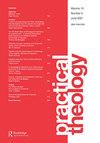Evangelicals engaging in practical theology: theology that impacts church and world
IF 0.4
0 RELIGION
引用次数: 0
Abstract
word on the subject. For example, it is a shame that Edith Turner’s work on communitas, the quality of relationships in a context of liminality, does not feature. There is also a great deal about liminality in Homi Bhabha’s third space theory that would have enabled a post-colonial perspective to be brought to bear on the project. But this is a book that, by its very nature, invites ongoing research and discovery, not least in the liminal space of contemporary missiology. As the authors say in the concluding chapter, ‘good theology is never “finished” or complete’ (218). I hope this text encourages further theological engagement with liminality, both to develop its theoretical versatility and extend its practical reach.福音派从事实践神学:影响教会和世界的神学
关于这个主题的单词。例如,伊迪丝·特纳(Edith Turner)关于社区的作品,即在边缘化背景下的关系质量,没有出现,这是一件令人遗憾的事。Homi Bhabha的第三空间理论中也有很多关于极限的内容,这将使后殖民主义的视角能够对该项目产生影响。但从本质上讲,这本书吸引了不断的研究和发现,尤其是在当代导弹学的边缘空间。正如作者在最后一章中所说,“好的神学永远不会“完成”或完整”(218)。我希望这篇文章能鼓励进一步的神学参与,既能发展其理论的多样性,又能扩大其实践范围。
本文章由计算机程序翻译,如有差异,请以英文原文为准。
求助全文
约1分钟内获得全文
求助全文

 求助内容:
求助内容: 应助结果提醒方式:
应助结果提醒方式:


